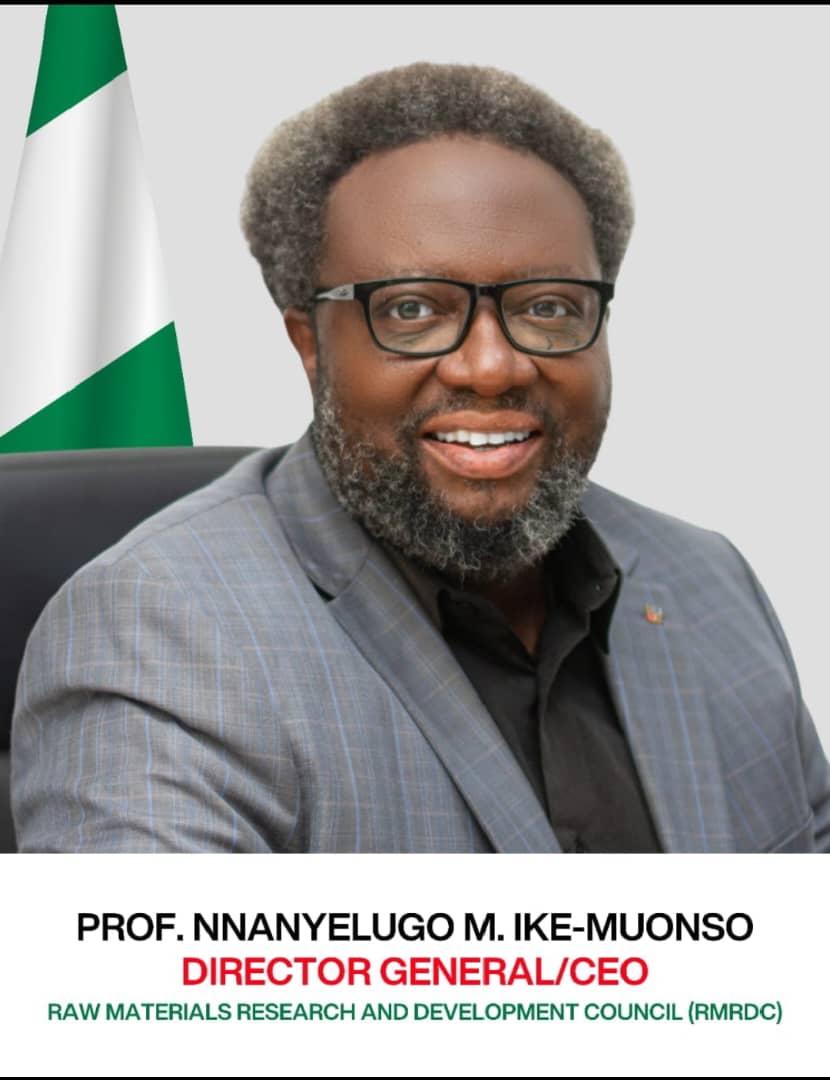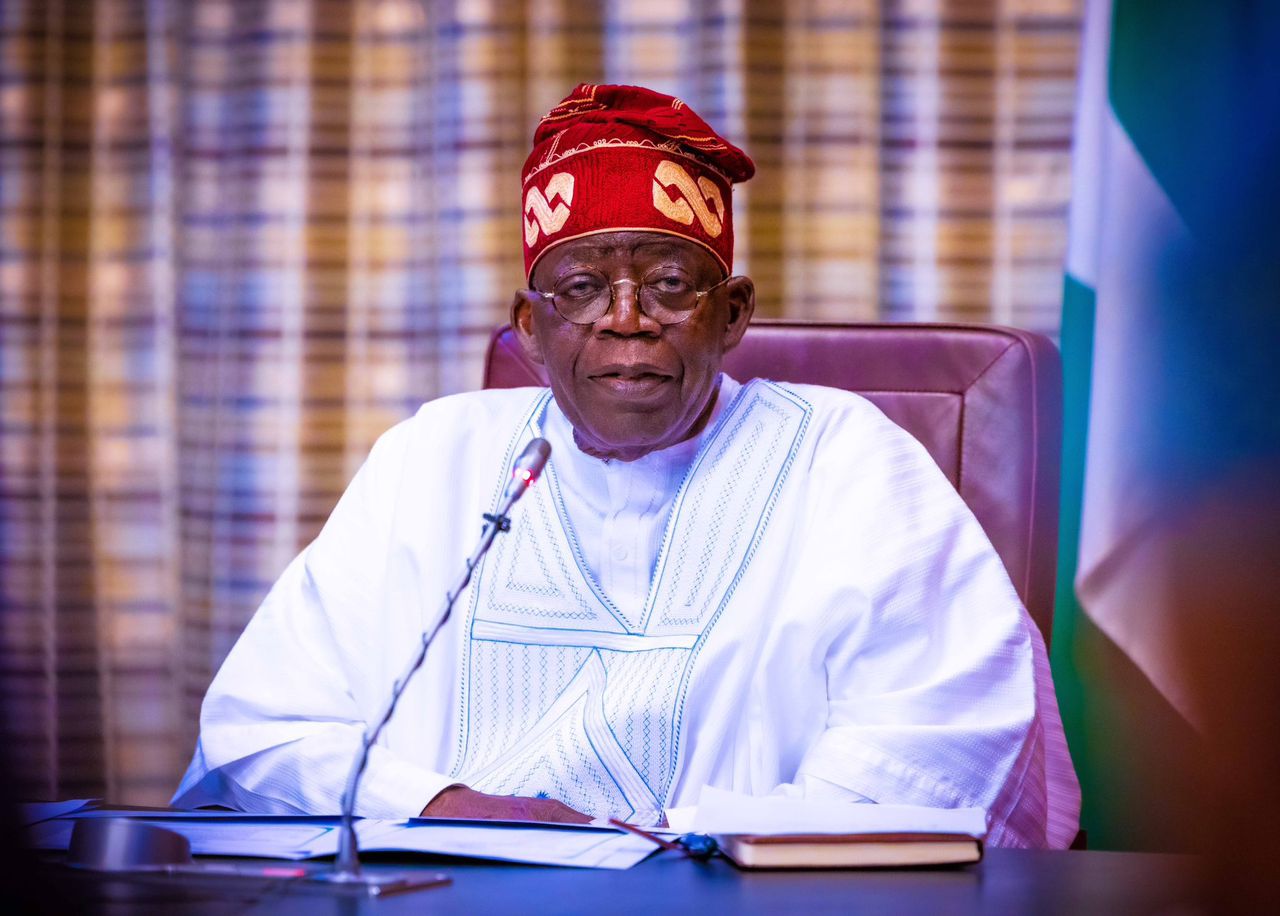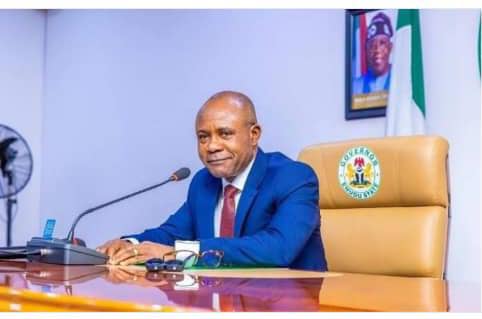by Ray Echebiri,
Professor Nnanyelugo Martin Ike-Muonso, a renowned economist and technologist, has assumed office as Director General of the Raw Materials Research and Development Council (RMRDC) at a time that is, arguably, the most crucial in Nigeria’s history. It is a time the country must move away from the perennial mouthing of economic diversification and the mono-economy it has regrettably relished for decades, and transit from consumption and import-dependency to production and export. This transition will entail promoting raw material beneficiation and value addition by ensuring that all raw materials intended for export from Nigeria undergo primary processing carried out within Nigeria by facilities approved by RMRDC, and implementation of an import substitution strategy that significantly reduces the country’s dependence on imported raw materials in the manufacturing process.
overlay-clevercloseLogo
His appointment is seen in many quarters as being in line with President Bola Tinubu’s effort to fit round pegs into round holes.
This is evident in his key appointments into Ministries, Departments and Agencies (MDAs) to drive his Renewed Hope Agenda, could therefore not have come at a more auspicious time. With a rock-solid background in social science and technology, specialisation and experience in raw materials marketing, research commercialisation and marketing of industrial chemicals spanning over three decades, Ike-Muonso has come into office fully equipped and aware of the pivotal role RMRDC could play in enhancing the development and optimal utilisation of Nigeria’s numerous raw materials for industrial growth, for the purpose of achieving sustainable growth and development for the country.
There can be no quick-fix solutions to Nigeria’s stunted industrial growth. Therefore, Ike-Muonso must begin with strategic goal-setting for the agency by clearly defining the objectives and targets to be achieved, with timelines. The objectives should include, very importantly, achieving global competitiveness in raw materials development. There are no local standards when it comes to raw materials development and, by extension, products, since the world is a global village.
RMRDC under Ike-Muonso should invest in the level of research and development (R&D) that would enable it to churn out results that are marketable to investors within and outside the country. This would involve research that is aimed at identifying and harnessing raw materials for effective use.
The ability to commercialise the research results of the agency would require synergy between it and the industrial sector by way of collaboration with relevant stakeholders to create actionable plans for raw materials acquisition, exploitation and development. As an economist of international repute, the director general understands this.
The emphasis on a push for commercialisation of research findings should be viewed against the background of the numerous setbacks Nigeria has suffered trying to get on the path of industrialisation, despite being endowed with more mineral and agricultural raw materials than many of the industrialised countries of the world.
One of the reasons Nigerian products are not competitive in the international market is poor quality, apart from issues like packaging and expiration, the latter often attributed to long delays associated with logistical problems and cumbersome processes at the country’s ports. The mandates of RMRDC include development of strategies for value addition to Nigeria’s raw materials and products to attract competitive prices in the global arena. The right research results would lead to higher prices not only for the country’s products, but also in export of raw materials, if not more, especially in areas such as agriculture and mineral resources. It goes without saying that an increase in export earnings from products and raw materials would enhance the country’s revenue drive, boost national income and make more money available for developmental purposes in critical areas such as infrastructure, healthcare and education.
Nigeria is the world’s largest producer of cassava. But due to factors that are not unconnected with poor research, the country imports most of its cassava derivatives that are used in the pharmaceutical and confectionary industries. The country’s failure (or inability, if you like) to add value to its raw materials has resulted in a situation whereby from production of 40 per cent of the world’s palm oil in the 1960s, it accounts for a paltry two per cent today, while Malaysia and Indonesia jointly produce over 80 per cent. It is worthy of mention that Malaysia was one of the countries (the other is Singapore) that took palm fruits from Nigeria in the 1950s to experiment on their growth, on their soil.
There is a need for RMRDC to encourage the use of machinery and processes for efficient exploitation and utilisation of raw materials. This, it would do, by paying greater attention to, and encouraging R&D that would bring about technological advancement and innovation in the country. This would, in turn, improve the quality of Nigerian products and enhance their competitiveness in the international market. Ike-Muonso’s rich background as a data scientist and analyst in business environment and economic evaluation should be an advantage in this regard.
One of the pitfalls in the country’s quest for industrial growth has been poor policy formulation and implementation. Where you have a well-formulated policy, the challenge may lie in implementation, which is often characterised by inconsistency and policy summersaults. With the commitment and zeal of the Tinubu administration towards economic diversification and industrial growth, RMRDC should strive at all times to come up with potent policies that would compel their implementation.
Among others, policies should be designed to promote local production while placing higher tariffs on imports and raw materials that are not very strategic to the country’s industrial development. For instance, an increase in local production capacities would boost industries in strategic sectors such as oil and gas, pharmaceuticals, cement, textile, shoe making, etc.
The agenda of RMRDC under Ike-Muonso should include development of export markets for the country’s products. This is in expectation that its activities are going to enhance not just increased productivity, but a remarkable increase in the quality of the country’s products to meet international standards. The agency should develop marketing strategies that include participation in international trade fairs in strategic markets around the world to enhance the visibility and competitiveness of Nigerian value-added products. This has the potential to open new markets and increase export opportunities for Nigerian products. The director general has on his shoulders the huge responsibility of positioning Nigeria to be able to reap immensely the benefits that are expected to accrue from the African Continental Free Trade Area (AfCFTA), potentially the largest market on the planet with an estimated population of 1.3 billion people.
The world has become one huge global marketplace. Since Nigeria is not an island, RMRDC’s tasks should include forging strategic partnerships around the world in a manner that would enhance the country’s drive for industrial growth. It should consider engaging with international partners for regular exchange of knowledge and global best practices, especially with regard to production and utilisation of raw materials.
Finally, RMRDC must have in place a feedback mechanism that creates a two-way communication between it and its stakeholders. This will allow free flow of information between it and its stakeholders, and enable the agency to monitor the effectiveness or otherwise of its activities.




